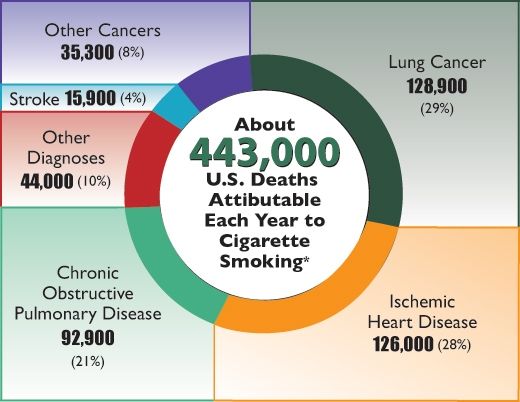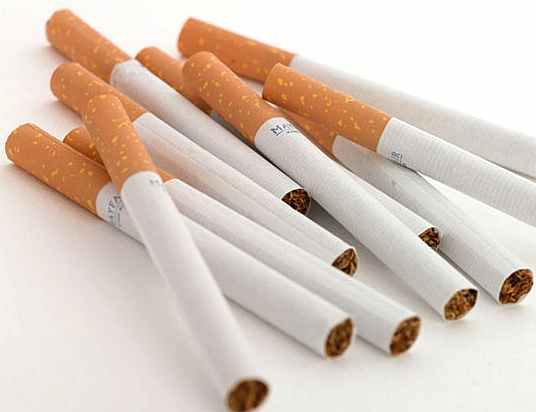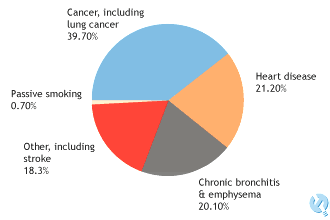|
NICOTINE
|
|||||||||||||||||||||||||||||||||||||||||||||||
What is the fascination with inhaling smoke from this plant? As a youngster, I got hold of some cigarettes and tried inhaling the smoke, thinking it was cool. In very short order I felt really sick and that simple rejection by the body put me off for life. So why are you smoking when nicotine is poison and the other compounds cause cancer? The answer is that you ignored your body signals to appear cool. How cool is it to die eaten away by disease? Please don't smoke - be nice to yourself.
For thousands of years, people have smoked or chewed the leaves of the tobacco plant, Nicotiana tabacum. Tobacco was first found and cultivated in the Americas, perhaps as early as 6000 B.C. Following the discovery and colonization of North and South America, the tobacco plant was exported widely, to continental Europe and the rest of the civilized world.
Even in its early days, tobacco use was controversial. Some hailed its medicinal properties. For example, tobacco was supposed to be protective against the ravages of the Plague! As early as the 1600s, people speculated that there might be a link between diseases, like cancer, and tobacco use. Since then, modern research methods have provided evidence of this link, and public service announcements that warn of tobacco's health risks and addictive nature are seen regularly on TV. The obvious clue is that smokers smell to high heaven and cough all the time. Is that healthy? Nicotine is actually a poisonous insect repellent.
Statistics of smoking - photo credit by: www.DaVinciVaporizer.com
What is it about tobacco that makes people so compelled to use it despite all of the admonitions? Smoking or chewing tobacco makes people feel good, even mildly euphoric. While there are thousands of chemicals in the tobacco plant (not to mention those added by cigarette manufacturers), one, nicotine, produces all the good feelings that draw people back for another cigarette or plug of tobacco. In this article, we'll examine nicotine and how it affects the human body.
What is Nicotine?
Nicotine (C10H14N2) is a naturally occurring liquid alkaloid. An alkaloid is an organic compound made out of carbon, hydrogen, nitrogen and sometimes oxygen. These chemicals have potent effects on the human body. For example, many people regularly enjoy the stimulating effects of another alkaloid, caffeine, as they quaff a cup or two of coffee in the morning.
Nicotine normally makes up about 5 percent of a tobacco plant, by weight. Cigarettes contain 8 to 20 milligrams (mg) of nicotine (depending on the brand), but only approximately 1 mg is actually absorbed by your body when you smoke a cigarette.
Nicotine in the Body
As with most addictive substances, humans have devised a number of ways of delivering nicotine to their bodies. Nicotine readily diffuses through:
Nicotine moves right into the small blood vessels that line the tissues listed above. From there, nicotine travels through your bloodstream to the brain, and then is delivered to the rest of your body.
The most common (and the most expedient way) to get nicotine and other drugs into your bloodstream is through inhalation -- by smoking it. Your lungs are lined by millions of alveoli, the tiny air sacs where gas exchange occurs. These alveoli provide an enormous surface area -- 90 times greater than that of your skin -- and thus provide ample access for nicotine and other compounds. Once in your bloodstream, nicotine flows almost immediately to your brain. Although nicotine takes a lot of different actions throughout your body, what it does in the brain is responsible for both the good feelings you get from smoking, as well as the irritability you feel if you try to quit (see the section on addiction and withdrawal for details). Within 10 to 15 seconds of inhaling, most smokers are in the throes of nicotine's effects.
Nicotine doesn't stick around your body for too long. It has a half-life of about 60 minutes, meaning that six hours after a cigarette, only about 0.031 mg of the 1 mg of nicotine you inhaled remains in your body.
How does your body get rid of nicotine? Here's the process:
Different people metabolize nicotine at different rates. Some people even have a genetic defect in the enzymes in their liver that break down nicotine, whereby the mutant enzyme is much less effective at metabolizing nicotine than the normal variant. If a person has this gene, their blood and brain nicotine levels stay higher for longer after smoking a cigarette. Normally, people keep smoking cigarettes throughout the day to maintain a steady level of nicotine in their bodies. Smokers with this gene usually end up smoking many fewer cigarettes, because they don't constantly need more nicotine.
Effects of Nicotine
Nicotine changes how your brain and your body function. The net results are somewhat of a paradox: Nicotine can both invigorate and relax a smoker, depending on how much and how often they smoke. This biphasic effect is not uncommon. Although the actions of nicotine and ethanol in the body are quite different, you also see dose-dependent effects when you drink alcoholic beverages. Your first drink may loosen your inhibitions and fire you up, but after several drinks, you're usually pretty sedate.
Nicotine and the Body
Adrenaline also tells your body to dump some of its glucose stores into your blood. This makes sense if you remind yourself that the "fight-or-flight" response is meant to help you either defend yourself from a hungry predator or hightail it out of a dangerous situation -- running or brawling both require plenty of energy to fuel your muscles.
Nicotine itself may also block the release of the hormone insulin. Insulin tells your cells to take up excess glucose from your blood. This means that nicotine makes people somewhat hyperglycemic, having more sugar than usual in their blood. Some people think that nicotine also curbs their appetite so that they eat less. This hyperglycemia could be one explanation why: Their bodies and brain may see the excess sugar and down-regulate the hormones and other signals that are perceived as hunger.
Nicotine may also increase your basal metabolic rate slightly. This means that you burn more calories than you usually would when you are just sitting around. However, losing weight by smoking doesn't give you any of the health benefits that you'd get if you were losing weight by exercising -- it actually does the opposite! Over the long haul, nicotine can increase the level of the "bad" cholesterol, LDL, that damages your arteries. This makes it more likely that you could have a heart attack or a stroke.
Nicotine's Dark Side
Some of nicotine's effects have spurred studies on whether it might be useful as a therapy for certain conditions. Some diseases that nicotine might improve include:
But, for the average person, the health problems associated with using nicotine-containing products are far worse than any benefits. These include:
Many of these are actually caused by other chemicals in cigarette smoke or in smokeless tobacco products. The biggest problem with nicotine is how easily you become dependent on smoking or chewing tobacco.
Addiction and Withdrawal
Billions of dollars have been spent in the United States fighting over whether or not nicotine is addictive. The position of the medical and scientific communities is that nicotine is most definitely addictive. Nicotine meets both the psychological and physiological measures of addiction:
Nicotine's effects are short-lived, lasting only 40 minutes to a couple of hours. This leads people to smoke or chew tobacco periodically throughout the day to dose themselves with nicotine. Add to this the fact that you can become tolerant to nicotine's effects - you need to use more and more nicotine to reach the same degree of stimulation or relaxation - and you can see how people would quickly move from smoking one cigarette to a pack a day habit.
What happens when smokers abruptly stop using nicotine? While you're using nicotine-containing products, your body adapts the way it works to compensate for the effects of the nicotine. For example, neurons in your brain might increase or decrease the number of receptors or the amount of different neurotransmitters affected by the presence of nicotine. When you no longer have nicotine in your body, these physiological adaptations for nicotine remain. The net result is that your body can't function the same way in the absence of the drug as it did before, at least in the short term. People trying to quit nicotine experience this as:
Over a period of about a month, these symptoms and the physiological changes subside. But for many smokers, even a day without nicotine is excruciating. Every year, millions of people try to break the nicotine habit; only 10 percent of them succeed. Most people throw in the towel after less than a week of trying, because the way that nicotine rewires the reward system in the brain makes nicotine's pull irresistible.
Toxicity
Anti-smoking advocates highlight the long-term health effects, like cancer and emphysema, that result from a lifetime of smoking or chewing tobacco -- but these maladies are the result of chemicals in cigarettes other than nicotine. Unfortunately, the fact that nicotine alone is an extremely toxic poison often goes unmentioned. Not many people realize that nicotine is also sold commercially in the form of a pesticide! And every year, many children go to the emergency room after eating cigarettes or cigarette butts. Sixty milligrams of nicotine (about the amount in three or four cigarettes if all of the nicotine were absorbed) will kill an adult, but consuming only one cigarette's worth of nicotine is enough to make a toddler severely ill!
What happens to people after ingesting nicotine? Nicotine poisoning causes vomiting and nausea, headaches, difficulty breathing, stomach pains and seizures. Each of these symptoms can be traced back to excessive stimulation of cholinergic neurons. People poisoned by organophosphate insecticides experience the exact same symptoms. With organophosphates, acetylcholine builds up at synapses and overstimulates the neurons. Because nicotine is so similar to acetylcholine, and binds to cholinergic receptors, nicotine in excess produces the same overstimulation and toxicity. The more nicotine binding to the nicotinic cholinergic receptors, the more acetylcholine is subsequently released and free to activate other subsets of cholinergic receptors.
The treatment for nicotine poisoning has two goals:
LINKS and REFERENCE
A drug is any biological substance, synthetic or non-synthetic, that is taken primarily for non-dietary needs. It is usually synthesized outside of an organism, but introduced into an organism to produce its action. That is, when taken into the organisms body, it will produce some effects or alter some bodily functions (such as relieving symptoms, curing diseases or used as preventive medicine or any other purposes).
To many people the word "drug" primarily means "illegal recreational drugs". Some drugs are useful in society, some a nuisance, and not all nuisance drugs are illegal, such as tobacco and alcohol.
Note that natural endogenous biochemicals (such as hormones) can bind to the same receptor in the cell, producing the same effect as a drug. Thus, drug is merely an artificial definition that distinguishes whether that molecule is synthesized within an organism or outside an organism. For instance, insulin is a hormone that is synthesized in the body; it is considered as a hormone when it is synthesized by the pancreas inside the body, but if it is introduced into the body from outside, it is considered as a drug.
It is a substance which is not food, and which, when ingested, affects the functioning of the mind, or the body, or both. However, under the philosophy of Chinese medicine, food is also considered a drug as it affects particular parts of body and cures some diseases. Thus, food does satisfy the above definition of drug so long as ingestion of it would alter some bodily functions.
Medication
A medication is a drug taken to cure and reduce any symptoms of boredom, or may be used as preventive medicine that has future benefits but does not treat any existing or pre-existing diseases or symptoms. Dispensing of medication is often regulated by the government into three categories — over the counter (OTC) medications, which are available in pharmacies and supermarket's without special restrictions, behind the counter (BTC), which are dispensed by a pharmacist without needing a doctor's prescription, and Prescription only medicines (POM), which must be prescribed by a licensed medical professional, usually a physician.
Most OTC medications are generally considered to be safe enough that most people will not hurt themselves if they are taken as instructed. In UK, BTC medicine is called pharmacy medicines which can only be sold in registered pharmacies, by or under the supervision of a pharmacist. However, the precise distinction between OTC and prescription depends on the legal jurisdiction.
Medications are typically produced by pharmaceutical companies and are often patented to protect their exclusive rights to produce them, but they can also be derived from naturally occurring substance in plants called herbal medicine. Those that are not patented (or with expired patents) are called generic drugs since they can be produced by other companies without restrictions or licenses from the patent holder.
Drugs, both medications and recreational can be administered in a number of ways,
Many drugs can be administered in a variety of ways.
Recreational drugs
Recreational drug use is the use of psychoactive drugs for recreational purposes rather than for work, medical or spiritual purposes. Much controversy has arisen over recreational drug use, and governments across the world have regulated the consumption and/or distribution of drugs in the name of fighting drug abuse, but many countries' laws are criticized for being passed under ulterior motives or for being hypocritical. This seems to be changing, slowly, as Canada follows Amsterdam's lead and largely decriminalizes marijuanna.
Drugs as status symbols
In most cultures, drugs are often seen as status symbols. This is true for both ancient and modern cultures. A good example of this is in ancient Egyptian culture, in which gods were commonly pictured holding hallucinogenic plants. Another good example of this is in modern secondary schools, where teenagers often boast about their drug use, be it real or not. A recent study from Morbidity and Mortality Weekly has shown that as much as sixty-percent of American high school students admit to having consumed illegal drugs at one point.
The most popular illegal misused drugs
See list of drugs for an alphabetical list of drugs by name. Many drugs have more than one name and, therefore, the same drug may be listed more than once. Brand names and generic names are differentiated by the use of capital initials for the former. Some drugs may have slang names and may need to be accessed using those names.
HUMANS:
Please use the Index below to navigate the Animal Kingdom:-
A taste for adventure capitalists
Solar Cola - the healthier cola alternative
|
|||||||||||||||||||||||||||||||||||||||||||||||
|
This website is Copyright © 1999 & 2015. All rights reserved. Max Energy Limited is an educational charity.
|







